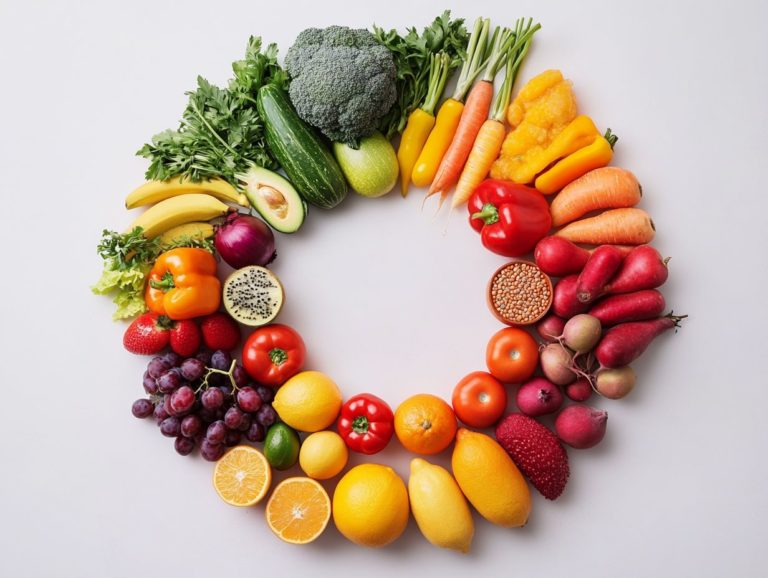5 Ways to Enhance Your Nutritional Knowledge
Understanding nutrition can truly be a game-changer for your health. With so much information available, it’s easy to feel overwhelmed.
This article simplifies the journey into five actionable steps. You ll master the essentials of macronutrients the nutrients your body needs in large amounts, like carbohydrates, proteins, and fats as well as micronutrients, which include vitamins and minerals needed in smaller amounts.
You will also learn how to effectively read nutrition labels and understand portion sizes. Plus, we ll explore dietary guidelines, current research trends, and how consulting a nutritionist can deepen your understanding.
Let s dive into some simple steps to take control of your nutrition!
Contents
- Key Takeaways:
- 1. Start with the Basics: Understanding Macronutrients and Micronutrients
- 2. Make Reading Nutrition Labels a Habit
- 3. Learn About Portion Sizes and Servings
- 4. Educate Yourself on Different Dietary Guidelines
- 5. Keep Up with Current Nutrition Research and Trends
- How Can a Nutritionist Help Enhance Your Nutritional Knowledge?
- Frequently Asked Questions
- What are the benefits of enhancing my nutritional knowledge?
- How can I start enhancing my nutritional knowledge?
- Is it important to enhance my nutritional knowledge if I am already eating a healthy diet?
- How can enhancing my nutritional knowledge impact my overall health?
- Are there resources to help me enhance my nutritional knowledge?
- How long does it take to enhance my nutritional knowledge?
Key Takeaways:

Understand the difference between macronutrients and micronutrients to build a strong foundation for nutritional knowledge.
Make reading nutrition labels a regular habit to better understand the content and portions of the food you consume.
Educate yourself on serving sizes and how they contribute to your overall nutritional intake.
1. Start with the Basics: Understanding Macronutrients and Micronutrients
Macronutrients and micronutrients are crucial for anyone aiming to improve their health. These components form the foundation for a balanced diet that supports bodily functions and helps prevent chronic diseases.
Macronutrients include carbohydrates, proteins, and fats, which provide the energy you need for daily activities. Carbohydrates are your main energy source, proteins are vital for building and repairing tissues, and fats play a role in nutrient absorption and hormone production.
Micronutrients, though needed in smaller amounts, are just as important. They support key processes like immune function and bone health.
Incorporating whole foods into your diet ensures a rich supply of fiber and antioxidants. These elements boost digestive health and reduce inflammation, ultimately supporting a stronger immune system.
2. Make Reading Nutrition Labels a Habit
Reading nutrition labels can deepen your understanding of what you eat. This habit empowers you to make informed choices about your food, helping you avoid added sugars and unhealthy processed options.
Pay close attention to serving sizes to accurately gauge your consumption. This awareness helps prevent underestimating your calorie intake.
Look for added sugars and essential nutrients like fiber and vitamins. These components are vital for your overall health.
When comparing products, it becomes easier to identify healthier options that fit your dietary goals. This simple habit enhances your eating choices and encourages mindfulness in shopping and meal prep.
3. Learn About Portion Sizes and Servings
Understanding portion sizes is key to managing calorie intake and achieving energy balance. This knowledge is essential for maintaining a healthy lifestyle and preventing chronic diseases.
Portion control empowers you to make smarter food choices. It also fosters a healthier relationship with food.
For example, using smaller plates can create an illusion of abundance, helping you feel satisfied. Measuring servings with cups or a food scale gives you a clearer idea of appropriate quantities.
Being aware of recommended serving sizes on labels can guide your decisions, aiding in effective weight management and ensuring you meet your nutritional needs.
4. Educate Yourself on Different Dietary Guidelines

Educating yourself on various dietary guidelines empowers you to embrace a balanced diet rich in whole foods, fruits, and vegetables. These components promote your overall health and reduce the risk of chronic diseases.
By understanding these guidelines, you can create meal plans that focus on healthy foods while limiting processed options. For example, adding colorful fruits and vegetables to your meals boosts your vitamin and mineral intake while enhancing flavor.
A practical strategy is to plan your weekly menus around whole grains, lean proteins, and healthy fats. Think of quinoa bowls topped with saut ed spinach and grilled chicken.
Using tools like food diaries helps track your adherence to these guidelines. This makes it easier to identify areas for improvement and celebrate your successes.
5. Keep Up with Current Nutrition Research and Trends
Staying updated with current nutrition research is essential for enhancing your health. It empowers you to make informed decisions based on the latest findings and expert advice.
Explore various sources, such as scientific journals and reputable health organizations, for a broader perspective on nutrition. Evaluate the credibility of these sources to separate fact from fad.
Understanding how to critically assess new trends helps you tailor personalized nutrition strategies to match your health goals. Continuous learning equips you to navigate the complexities of food science.
How Can a Nutritionist Help Enhance Your Nutritional Knowledge?
A nutritionist provides personalized advice and strategies that elevate your nutritional knowledge. They guide you in making dietary choices that align with your health goals and reduce the risk of chronic diseases.
By evaluating your unique eating habits, a nutritionist can create meal plans that address your nutritional needs and personal preferences. They will explain the essential roles of macronutrients, which include proteins, fats, and carbohydrates, empowering you to make informed choices.
These professionals address health concerns such as food intolerances and obesity through tailored dietary interventions. This holistic approach deepens your understanding of how food affects your body, leading to better health outcomes.
What Are Some Common Nutrition Myths and Misconceptions?
Addressing common nutrition myths is essential for improving your understanding of food choices. Misinformation can lead you to make poor dietary decisions that harm your health.
For instance, you might believe all carbohydrates are bad. In truth, they provide essential energy for your body. Similarly, healthy fats support brain health and hormone production.
Some people think dietary supplements can replace a balanced diet. This misconception can lead you to overlook whole foods, which offer richer nutritional benefits.
By debunking these myths, you can make informed food choices that pave the way for healthier eating habits and enhance your well-being.
How Can You Incorporate Nutritional Knowledge into Your Daily Life?

Incorporating nutritional knowledge into your daily life is entirely achievable through practical meal planning, mindful eating practices, and making informed food choices that prioritize your health. Take charge of your health today!
By dedicating a bit of time each week to create a meal plan, you can ensure that your grocery list features a vibrant mix of whole foods, including fresh fruits, vegetables, lean proteins, and whole grains.
As you navigate the grocery store, pay close attention to labels. Choosing items with fewer processed ingredients ingredients that have been altered from their natural state can significantly elevate the nutritional quality of your selections.
When you cook at home, don t hesitate to experiment with new healthy recipes! This adds excitement to your meals and boosts their nutritional value.
Dining out? Choose dishes that spotlight vegetables, and consider requesting dressings and sauces on the side to maintain control over what goes into your meal. Being mindful of these choices enhances your health now and supports long-term wellbeing.
What Are Some Helpful Online Resources for Nutritional Information?
Utilizing reliable online resources for nutritional information gives you the power to make informed dietary choices, ultimately enhancing your overall health with trustworthy data and guidelines.
By diving into platforms like the USDA’s FoodData Central, you can tap into a comprehensive nutritional database that outlines the nutrients in different foods.
Government health websites, such as the CDC and WHO, provide essential guidelines and tips for maintaining a balanced diet. Credible health blogs like Nutrition.gov and Verywell Fit offer practical advice and the latest research findings.
These resources deepen your understanding and inspire healthier habits, enabling you to tailor your eating patterns to align with your personal health goals and dietary needs.
How Can You Stay Motivated to Learn About Nutrition?
Finding ways to stay motivated in your pursuit of nutritional knowledge is essential for maintaining a lifelong commitment to health and well-being. It encourages continuous learning and helps you apply healthy eating habits effectively.
To nurture this motivation, start by setting personal goals that align with your specific health aspirations whether that s boosting your energy levels, managing your weight, or enhancing your overall wellness. Keeping a journal to track your progress serves as a tangible method to measure your achievements.
Engaging with communities or groups focused on nutrition can cultivate a sense of belonging and accountability. In these spaces, you can exchange ideas and tips while receiving support, ultimately enriching your journey toward healthier eating and making it a more enjoyable experience.
Sharing your nutritional expertise with others not only enriches your understanding but also cultivates a supportive community dedicated to health. This environment fosters collaboration and growth through nutrition education and shared experiences.
By organizing workshops, you can create dynamic, interactive spaces where participants dive into hands-on learning about meal planning, choosing ingredients, and understanding food choices.
Writing helpful blogs allows you to disseminate valuable insights widely, reaching a broader audience eager for guidance on healthy eating habits.
Engaging actively in social media discussions helps cultivate an inclusive atmosphere where ideas flow freely, questions receive thoughtful answers, and inspirational success stories are shared. This reinforces the collective importance of good nutrition, making it a shared goal for all.
Frequently Asked Questions

What are the benefits of enhancing my nutritional knowledge?
Increasing your nutritional knowledge helps you make informed choices about your diet. You can boost your energy levels, improve digestion, and lower your risk of chronic diseases.
How can I start enhancing my nutritional knowledge?
1. Read nutrition labels: Understand what s in your food by reading nutrition labels. This helps you grasp the ingredients and their nutritional value.
2. Consult a dietitian: A dietitian offers personalized, science-based advice to improve your nutrition knowledge.
3. Attend workshops: Many community centers and health organizations host nutrition workshops. Use these opportunities to learn!
4. Follow reliable sources: When searching online, stick to trustworthy sites like government websites or registered dietitians pages.
5. Experiment with recipes: Trying new recipes introduces you to different foods and their nutritional benefits.
Is it important to enhance my nutritional knowledge if I am already eating a healthy diet?
Yes, enhancing your nutritional knowledge helps you optimize your diet. You ll ensure you’re getting essential nutrients and make better choices, even when dining out.
How can enhancing my nutritional knowledge impact my overall health?
Understanding nutrition can greatly improve your overall health. It helps maintain a healthy weight, boosts your immune system, and reduces your risk of diseases like heart disease and diabetes.
Are there resources to help me enhance my nutritional knowledge?
Many resources can aid your journey! You can consult a dietitian, attend workshops, read books, follow reliable websites, or experiment with recipes. You can also use apps and tools to track your nutrition!
How long does it take to enhance my nutritional knowledge?
Enhancing your nutritional knowledge is an ongoing process that varies for everyone. With consistent effort, you can continuously improve your understanding over time!






